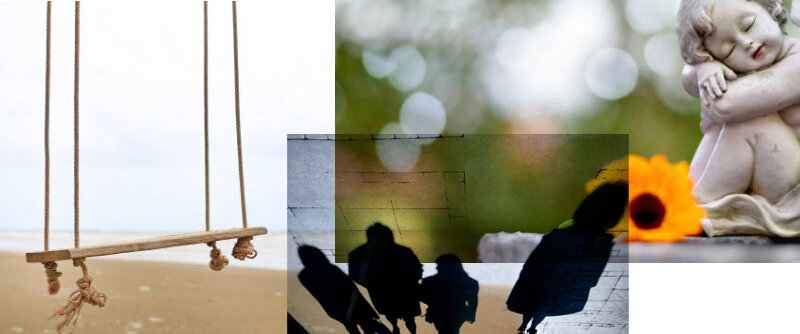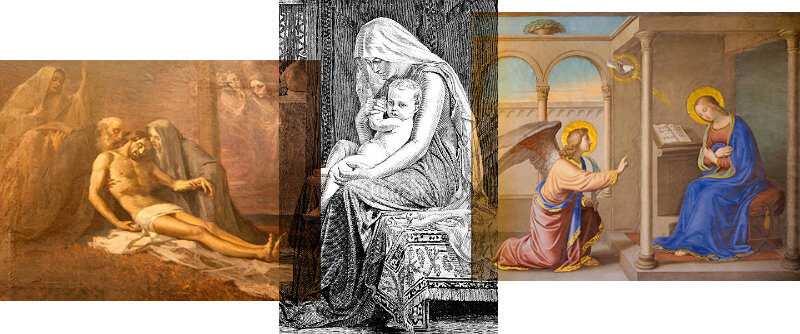God’s Unfolding Story
An angel came to Joseph in his dreaming
And warned him so his family could flee.
As they escaped king Herod’s evil scheming,
The son of God became a refugee.
How many children die without such warning?
How many mothers will not be consoled,
Their voices choked with anger, tears, and mourning,
For songs unsung and stories never to be told.
Adam M.L. Tice
From A Weary Couple © 2015 GIA Publications, Inc.
What a humbling privilege to sing this prayer just three Christmases ago, gasping for air after each phrase, my lungs squished so high up into my throat by a bursting-at-the-seams, eight-month-pregnant belly. A foot kicked its way into my ribs, tears filled my eyes, and I was stunned—choked—into a greater intimacy with our pregnant Mother than I ever thought possible. The third trimester changes you, as any pregnant woman would tell you. When your third trimester falls during Advent, the air is dripping with theological reflection that makes pieces of the world, both past and present, finally make sense—in fact, they become more urgent. More pressing. The life growing inside of me was stretching me in ways my body and mind were simultaneously resisting and plunging deeper into.
But there are many ways that we are stretched.
From the Advent carols to tiny babe statues of Nativity scenes passed down through generations, the gift of intimate companionship with Mary through the last physically uncomfortable and mentally taxing days of pregnancy completely transformed my heart, gearing me up for this new vocation in life—motherhood. Symbols of mother and child are ringing in our ears, shining in our eyes, and tugging at the heartstrings of sacred and secular daily living.
But the Mother of God was called to more than labor and delivery.
As spiritually rich as the experience of pregnancy is, it is not without its share of pain, and as all expectant mothers know, moments of incredible doubt. Am I eating the right things? Am I exercising enough? Too much? I haven’t felt the baby move for a while—is the baby still ok? Will I have a healthy delivery? Am I enough?
The Mother of God knew the questions of both life and death for her child.
And death isn’t a comfortable thing for us to think about. Not ever. But especially in Advent, especially if you are or long to be pregnant, when the world is full of images of expectation, and assurances, and family, and big, hope-filled children’s eyes as they snuggle in close to wait for the excitement that comes next.
But Advent is different for women and men who know their child’s death.
Over the last three years, I’ve been blessed to know women and men, mothers and fathers, chaplains, liturgists, parish ministers, and priests who search for a sacred language that acknowledges the holy longing for a child and the life-altering experience of losing a child in the womb. I’ve had the privilege of walking with some of those who know that road of grieving all too well.
And I’ve felt ill-equipped in my effort to be aware and present. My own discomfort and lack of familiarity plays into the cultural tendency to categorize this as a “taboo topic” or even a “women’s issue.” But the reality is, children die. Sometimes while you are holding them. And sometimes before you get to.
And the Mother of God knows what it means to watch her child die.
Those who struggle with the inability to conceive, those who know the pain of losing a child before birth, and those who have faced their infant’s death at the time of birth know that this season of mourning is often held inside, hidden and unseen. What was anticipated to be a joyful and exciting time becomes, instead, a plunge into despair. Couples expecting to announce to the world a sign of their love in a visible, living, co-creation with God are instead met with feelings of confusion, disappointment, fear, and anxiety. Women who spend their whole lives dreaming of their role in bearing light to the world in the form of a child now shift to dark questions about their own value and worthiness; their bodies, once a source of life, have become in this moment a place of death. Some have redefined their lives after their experience. Some look for solace over and over again, as each encounter with loss permanently weaves itself into their story. And there is no warning for this kind of loss. There are no angels who appear in a dream, who tell them how to avoid the pain, how to escape the terror. For many, marriages become strained, the weight of doubt and grief is isolating, and even the conversation with God seems quiet.
But God does not abandon us. Somehow, on the other side of loss an incredible story of resilience emerges. Bodies, though they are never the same again, heal. Couples try again, adopt, or reimagine. Those who mourn in isolation find not one, not two, but a community of others with whom they can identify. God’s silence is not absence; it is the patient listening of a God who knows our grief first-hand, who weeps with us, who holds us as a mother holds her child. Death is never the whole story. The hope of new life surprises, confounds, persists.
I tell my own story lightly, because mine ends with a radiant, rambunctious two year old. But my husband and I experienced just a glimpse of that darkness. Around the 11th week, we learned that we had a very high risk pregnancy, and the results of some testing showed that there may be an impending miscarriage. For days before I saw the results, I was inconsolable, holding my belly, desperately wanting to embrace my little one. Did Mary hold her belly with anguish, too? I was grief stricken, and guilt-ridden beyond belief—what had I done to cause this? Why was this happening to us? How could I be faced with the possibility of needing to let go so soon to this little bundle that I had already placed so much hope in? I’m still haunted by survivor’s guilt that it is God’s will that our little Ava is still with us. I know that so many times, this story ends differently, and our communities often shy away from the uncomfortable topic of miscarriage and stillbirth. We need to do better.
Mothers who are grieving the loss of their child are perhaps the closest to the Mother of God of all. This is the Mary at the Foot of the Cross. And that Mary is the same young Jewish girl who knew that when an angel visited her that night, that things would be different now. That maybe the world would never understand. That this road was hard. This is the young woman we wait with during these weeks.
Take care this season not to add to pain when language fails us. Be careful not to suggest that we pray for women who’ve “lost” their children. It is no mother’s fault when a child is lost to them. You lose your keys, you lose your train of thought—you do not lose your child. And we are complex beings, who may not have all the answers, but who are entirely capable of stretching ourselves to pause before we speak. We must remember that our Advent waiting is filled with people who are grieving. Right in the midst of each parish community are parents who will never get to bring their children to Mass each week, who don’t get to explain what the purple and pink candles mean to us, who don’t get to spoil or squeeze or scold their little miracles. There are people who can still cling to the belief that light will overcome the darkness. And there are others who can’t.
A priest friend of mine, Fr. Bob Oldershaw, was recently tasked with one of the more impossible funeral homilies of his life—that of a three month old baby who was lost to SIDS. Wise enough to know that what’s often best in these difficult moments is an economy of words and an abundance of presence, his message was simple: God doesn’t take…. God catches. God doesn’t take—God catches. God caught that little baby in heaven—she is not alone, not in pain, not suffering.
Slowly, through the course of their whole lifetime, God is catching these grief-stricken parents through the grace of the presence of the community that surrounds them. Perhaps, in a way, that’s what God was doing in that final message of Jesus to his mother and his friends: Woman, behold, your son. Catch him. Beloved, behold your mother. Catch her. Love her. Savor this holy extension of the embrace of Mother God.
So many of us are waiting to be caught by God. And that need to be held, rescued, heard doesn’t fade during these Advent weeks of expectation. For many, the expectation to be filled with joy makes the despair that much heavier. Be the community that can catch each other. Wait with each other. Know that joy, grief, and co-creation with God can look much different than we thought. And take comfort, even when community fails you, in feeling God’s presence weeping with us, waiting with us, calling us toward a glory which we cannot dream of for ourselves.
But still the angels sing their hymn of “Glory”
Beyond our fears that never seem to cease.
For Christ has come, and God’s unfolding story
Redeems the world to live in love, good will, and peace.
Adam M.L. Tice
From A Weary Couple © 2015 GIA Publications, Inc.
Kate Williams
Kate is the Senior Managing Editor at GIA Publications, Inc. She holds a Bachelor of Music Composition degree from DePaul University in Chicago, Illinois as well as a Masters of Arts in Liturgical Studies degree from Catholic Theological Union in Hyde Park neighborhood of Chicago where it was her privilege to study as a distinguished Bernardin Scholar.
She serves as workshop leader, consultant, and musician in the Archdiocese of Chicago and abroad, following a passion to serve in multicultural, multigenerational communities, while mentoring young voices and building bridges through music ministry.





